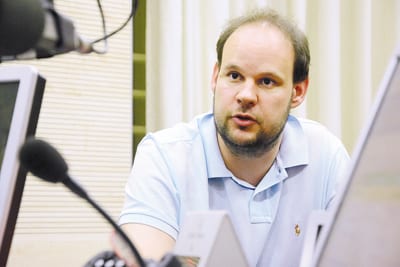According to some statistics, cars remain parked for over 90% of the time. Owners drive them mainly to work and back, and then spend a good part of their time stuck in traffic congestion. And parking is a huge problem all over the world, and one that’s growing. Creators of the future go so far that they will enable each owner of a Tesla car to work, enjoy and relax in their self-driving car while driving to work, and then, like a chauffeur, the car will drop them off in front of their company. Then, with one click of their mobile phone, the owner switches the car to “earn mode”, in which the car acts as a city taxi, driving and charging those who don’t have a car and require transportation.
This is another in a series of blows against the workforce. Thousands and thousands of taxi drivers will lose their jobs. This would even hit Uber. Tesla is already working on a self-driving truck. Like Uber, which is following Tesla closely, because it knows what awaits it. Uber must adapt, otherwise, it will “disappear” as a taxi business. What do you think will happen when the first truck of that kind appears on the market? An unbelievable number of haulage drivers will lose their jobs.
And where is IT in all of that? Everywhere! IT has been, is and will be the biggest part of our future, alongside food. But even there, in the food business, IT is very important. No business can function today without some kind of ICT programming support. From a standard car mechanics business where the owner has a program for managing, controlling and invoicing and CRM, through an agribusiness, where there are existing high-quality platforms for connecting buyers and sellers of livestock and poultry, all the way to space travel. Simply, nothing can be done without IT. That may sound like a cliché, but it’s true.
 Until only around ten years ago, banking – at least in Serbia – was based on manual human labour. Foreign currency payments were carried out through communication with foreign banks, sending documents by fax and manually posting accounts. Today, business processes in a bank, which were performed by teams of people, are now done by a man with the support of a computer and an entire IT system. And that is maintained by… guess who? Programmers.
Until only around ten years ago, banking – at least in Serbia – was based on manual human labour. Foreign currency payments were carried out through communication with foreign banks, sending documents by fax and manually posting accounts. Today, business processes in a bank, which were performed by teams of people, are now done by a man with the support of a computer and an entire IT system. And that is maintained by… guess who? Programmers.
In principle, everything is done by computer: automatic processing and control of foreign exchange deposits, automatic accounting and automatic displays of lists of errors. One person monitors and controls that process, and responds when needed. And what about the cash register on the counter? Once upon a time, employees manually counted thousands of dinars, carried out controls and wrote on paper.
Today, with one-click, a bank’s program sends instructions to an ATS device, which is located at the other end of the counter from the employee, which automatically counts the money, issues it and releases it to the client. That is all IT. Someone had to write a program. A program that will do something to ease and speed up business processes, all with the aim of reducing errors and risk.
Retraining is of crucial importance. Jobs that existed 5 to 10 years ago do not exist today. “If I’d asked customers what they wanted, they would have told me – a faster horse”, said Henry Ford. He destroyed entire businesses and industry with one stroke. His automated production line for cars destroyed the horsedrawn cart business and the transport business, even the rail business. Everybody started buying and owning cars. Market losers complained and protested, but the car remained.
Today, after many decades, we are talking about the disappearance of the car as we have known it until now; about a time when no one individual will possess a driving license, because their driving licenses will be registered to vehicles and not people.
The price per hour for programmer’s work has grown so much, not only in the world but also in Serbia, that it has reached unimaginable levels. While some people work 16 hours a day for a monthly total of 20,000 dinars, a web designer can make an average WordPress site in a few days and charge twice as much
When it comes to communications, once thousands of employees in telecommunications companies manually switched connections and brought people together across countries and around the world. Today that is done by computers. And maybe you’ve forgotten that the refrigerator destroyed the businesses of ice manufacturers.
We can also recall typists – a profession that has disappeared entirely. Today there is almost nobody who doesn’t know how to use a computer keyboard and personally type a document – a task that was once performed exclusively by typists. Times change, and people with them. Whoever has recognised changes and adapted to them has succeeded. As for others, well, life will not be easy at all for them.
We live in times that are faster and more disruptive than ever before, and to which it is not easy to adapt. But IT is a secure future. IT is there to support any business, whether offline or online. IT also supports marketing, which is necessary for every business, because every business should have a website. The easiest way to enter the world of IT is to learn Web design, PHP and WordPress. The price per hour for programmer’s work has grown so much, not only in the world but also in Serbia, that it has reached unimaginable levels. While some people work 16 hours a day for a monthly total of 20,000 dinars, a web designer can make an average WordPress site in a few days and charge twice as much.
Serbia has long since surpassed the export of raspberries, of which we are so proud. Exports of the IT sector in Serbia have now tripled compared to the 2008-2015 period, when the overall volume of ICT services was worth €680 million, despite the constant shortfall of experts. It is estimated that Serbia is lacking between 10 and 15 thousand IT professionals.
Education, particularly higher education, is still not aligned with the trend of supply and demand in this area, which is why private courses and private schools offering IT programs are flourishing. The problem is that people are generally not accustomed to changes, particularly Serbs. While in the West, especially in America, it is somehow normal for employment purposes to result in a change of residence not only in a city but in entire countries, while in Serbia that is almost unthinkable. Doctors are not prepared to move from Belgrade to Kikinda for the sake of employment, which means Kikinda has a shortage of professional medical staff.
On the other hand, other types of changes are required for IT, tough psychological ones. Programmers, web developers and others in the IT field are fortunate that, in addition to earning huge salaries, they can also work from home. Nobody forces them to relocate hundreds of kilometres away. The world is hugely globalised and IT workers can operate on the global market from home, wearing slippers and a dressing gown, never needing to leave their house. Due to the permanent lack of professionals in the IT sector, there is plenty of work available in almost all major cities in Serbia, from Niš, Novi Sad, Subotica, Kragujevac and Kraljevo, to the country’s smaller towns and cities.
Of course, in addition to changing the awareness and mentality of citizens, there must also be changed in the mentality of the state, laws and regulations. There is a huge imbalance between modern legal practise in advanced countries and in Serbia. There are many laws that hinder operations in this sector. Some of the largest IT companies that are presented as Serbian aren’t Serbian at all, nor do they work in Serbia – rather they are based in Ireland, Bulgaria or Romania. They carry out procedures via the internet, in five minutes, without crossing a border, without a stamp and without bureaucracy.

Exports of the IT sector in Serbia have now tripled compared to the 2008-2015 period, when the overall volume of ICT services was worth €680 million, despite the constant shortfall of experts. It is estimated that Serbia is lacking between 10 and 15 thousand IT professionals
Many countries offer excellent conditions for business with modern laws that enable companies to do business in a modern way. Because of that, some of the biggest “Serbian” companies in Serbia have only “cheaper” labour in Serbia, in the form of armies of programmers. Salaries of programmers in Serbia are less than their counterparts in Europe and America. But for local conditions, they are extremely high incomes, which enable individuals and families to live very well and in harmony with their profession. And so, like a jigsaw puzzle, the parts come together in order to optimise operations.
Representative offices of firms are located abroad, where they can control payments via cards, PayPal and other online payment methods, without bureaucracy, torment, constant inspections and outdated laws, while in Serbia they engage high quality IT personnel for less money.
Just imagine what would happen if the state decided to modernise laws? If it changed the outdated and inadequate Law on Foreign Currency Operations; if it enabled PayPal within the country; if it introduced progressive taxation? If it introduced freelancers into laws and enabled them to operate and work normally? If it eliminated business stamps, inflow reporting and all the other regulations that increase bureaucracy and push our people into opening companies abroad? Then nobody would open a company abroad, the tax would be paid in Serbia, and the situation would be better for everyone. Moreover, we would create such an enabling environment that ever more foreign companies would come to our county and open their representative offices here. As such, the mentality of the whole country must be changed, not just people.
And to end – one great example. A young man graduated in journalism, worked for a long time at a sports journal, then quit and took a job in a bank. There he did a job that had absolutely nothing to do with journalism and sport, nor with IT. Then he spent a year and a half secretly attending IT courses, resigned from the bank and took a job as a programmer in one of the largest insurance companies in Serbia. We can achieve everything when we want to, or, to quote great men: If you want to win – you mustn’t lose!
Darko Vidić is an Internet Entrepreneur and Founder and Director of Green Design